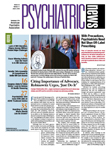Three male postal workers did a good job sorting mail until they were asked to interact with the public. Then the difficulties began.
Another man used to lie on the floor during social occasions and fall asleep. His wife thought that he was eccentric.
Still another man always took the same route to the bus stop. One day a woman got in his way, and he beat her up.
All five of these men, it turned out, were found to have autism spectrum disorders (ASD), reported Rutger Jan van der Gaag, M.D., Ph.D., at a symposium on ASD in adults at APA's 2008 annual meeting last month in Washington, D.C.
Van der Gaag, a professor of clinical psychiatry at Radboud University Nijmegen in the netherlands and an ASD expert, indicated there may be many more adults who also have ASD.
So how does one recognize them?
Talent in computer or engineering work is often a hallmark of adult ASD, van der Gaag reported, although certainly not all adults with an ASD have such talent. Other common characteristics of adults with ASD, he pointed out, are being unsociable, extremely rigid, given to angry outbursts, and being acutely sensitive to light, heat, and pain.
There are various reasons why individuals with ASD may reach adulthood without being diagnosed, indicated both van der Gaag and Bram Sizoo, M.D., another Radboud University Nijmegen professor and ASD expert. These disorders are generally considered children's illnesses, not those of adults. The DSM-IV diagnostic criteria for ASD apply to children, not adults. Furthermore, the separation of child and adult psychiatry may make it difficult for adults with ASD to find someone to diagnose and treat their condition. Intelligence can mask or compensate for symptoms. ASD unsociability can mimic social anxiety disorder. And since Axis I disorders—for example, anxiety, depression, or attention-deficit/hyperactivity disorder (ADHD)—or Axis II disorders—say, schizoid personality disorder or avoidant personality disorder—can coexist with adult ASD, comorbidity can render the diagnosis of adult ASD all the more difficult. For instance,“ It is a lot easier to diagnose ADHD than ASD” in adults who have both, Patricia van Wijngaarden-Cremers, M.D., pointed out. She too is an ASD expert affiliated with Radboud University Nijmegen.
If diagnosing adults for ASD is a challenge, treating it is just as problematic, Sizoo indicated. True, there is some evidence that the atypical antipsychotic medication risperidone can decrease aggressive outbursts in youngsters with ASD, he said. And in two studies of adults with ASD, SSRI antidepressants led to a decrease in repetitive behaviors and to somewhat more socializing, he added. In addition, there is some evidence that cognitive-behavioral therapy can counter anxiety and depression in adults with ASD, he noted. And there are also indications that social-skill classes can help, he pointed out. But even with a psychiatrist's best intentions, he conceded, such interventions may fall short since the neurochemistry of ASD is still a mystery, and there are no treatments for ASD per se, only for some of the symptoms.
So what is needed, Sizoo stressed, is individualized management of adults with ASD. He said he and his colleagues use a stepped-treatment approach provided by various specialists and orchestrated by a case manager.
However, as an American psychiatrist in the audience commented, “Even though adults with ASD are of increasing relevance to us adult psychiatrists, I can only yearn for the integration of services that you have in the Netherlands.” ▪

